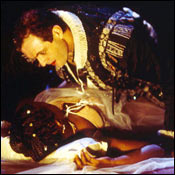
Dr. Johnson famously complained that the good effects of Cymbeline were “obtained at the expense of much incongruity.” The scholarly retort is that Shakespeare’s last plays were, in the tradition of the romance, tragicomic fantasies predicated on the unfettered play of the imagination. Though Cymbeline has several far-flung sources (Boccaccio chief among them), and takes place simultaneously in Roman Britain and Renaissance Rome, to hell with Johnson’s niggling pedantry.
There is much to admire in Shakespeare’s ability to combine plots and subplots of such diversity and create a dénouement in which any number of knots are blithely unraveled. The plucky heroine, Imogen – a faithful wife intrigued against by the would-be seducer Iachimo and lusted after by the doltish would-be rapist Cloten, her life threatened by her exiled husband, Posthumus, misled into believing her a strumpet – is one of Shakespeare’s most lovable female characters. Yet one justly wonders whether she would mistake Cloten’s decapitated body for that of her spouse.
Never mind. It is a rattling good yarn, which our Theatre for a New Audience unveiled in November at the Royal Shakespeare Company’s Other Stage in Stratford-on-Avon. Bartlett Sher’s staging adds further hokum by turning the banished lord Belarius and the two putative sons he raises as hunters in the wilderness (actually the princely offspring of King Cymbeline) into characters in a Wild West movie. Other liberties are taken. The two gentlemen from the play’s beginning become Storytellers I and II, assuming, in modern dress, various roles throughout; whereas the ghost of Posthumus’s mother is retained, Jupiter and the other ghosts are not.
There are a few casting or directing hitches. The not untalented Boris McGiver turns Iachimo into a creature so slimy and posturing that Imogen would never have let him in, Philip Goodwin exudes his customary indigestible gaminess as Storyteller I, Randy Danson is overexplicit as the evil stepmother-queen, and Erica N. Tazel is too much the minxish soubrette as Imogen. And shouldn’t one cut, for a black actress in bed, “fresh lily … whiter than the sheets”?
The others will all do, with Michael Stuhlbarg’s understated Posthumus and Earl Hindman’s irrepressible Belarius most noteworthy, followed by Andrew Weems’s Cloten and his papier-mâché horse in dead heat. Christopher Akerlind, better known as a lighting designer, supplies a rather too red-accented and minimalist décor and showy lighting, some of it brazen neon. Elizabeth Caitlin Ward’s costumes are suitably antic; Peter John Still’s musical interludes, complete with songfest act finales for the entire cast gathered around floor mikes, are amusing but overfacile.
If you cherish the memory of David Lean’s fine 1953 movie version of Harold Brighouse’s 1916 play (not 1915, as in the program) Hobson’s Choice, you may forgo its revival by the Atlantic Theater Company. It is the story of a Victorian Lancashire bootery owned by the bibulous and despotic Hobson, who exploits his three daughters as unpaid help and prevents their liberation by marriage. In the cellar toils mousy Willie Mossop, unsung hero of the region’s best footwear. Feisty Maggie, the eldest Hobson daughter, bullies that timid, illiterate soul into marrying her, and turns him into a real man and powerful competitor who brings Hobson, as both merchant and domestic tyrant, to heel. Willie takes over the business but admits the old man as silent partner, as the two younger daughters become free to marry.
This is a droll and well-crafted boulevard comedy, decently directed by David Warren and designed by Derek McLane (sets) and Laura Bauer (costumes). Martha Plimpton is a quietly commanding Maggie; as Willie, David Aaron Baker is very good in the early parts, but even better when the shoe is on the other foot and Willie has taken command; the usually splendid Brian Murray is funny, but softens the bullying Hobson into a huffing, eyeball-rolling teddy bear. From the routine supporting cast, Peter Maloney stands out as a no-nonsense Scottish doctor. There is nothing here to equal the performances of Charles Laughton, Brenda de Banzie, and John Mills in the movie, but if you haven’t seen it, or don’t fear creating a mental palimpsest, a visit to the play might not prove bootless.
Reversing the usual order, Stephen Belber’s play Tape reaches us after Richard Linklater’s torturous movie version. Ten years out of school, three former high-school chums foregather in an East Lansing motel room. Vince, now a fireman, loved Amy, now an assistant D.A.; she loved Jon, now a filmmaker, who date-raped her after the senior prom. Vince is a heavy drinker and druggie, Jon has flown in for a screening of his movie at the local festival, and Amy shows up at Vince’s invitation, unprepared to meet also Jon, on whom Vince springs this unwanted confrontation.
It all centers on Vince’s wanting to know just what happened after that prom, followed by extracted confessions and misfired retribution. The tone is that of rancorous comedy, and there is skill in the writing, but the play, unlike the movie, is weighed down with a confusing prologue and a clumsy epilogue. Geoffrey Nauffts has smoothly directed the very able Josh Stamberg and Alison West and, as Vince, the possibly even better Dominic Fumusa, who manages to be almost unnaturally natural.
Cymbeline
Theatre for a New Audience revival of the Shakespeare play, directed by Bartlett Sher.
Hobson’s Choice
Atlantic Theater Company revival of the play by Harold Brighouse, directed by David Warren.
Tape
By Stephen Belber, directed by Geoffrey Nauffts.